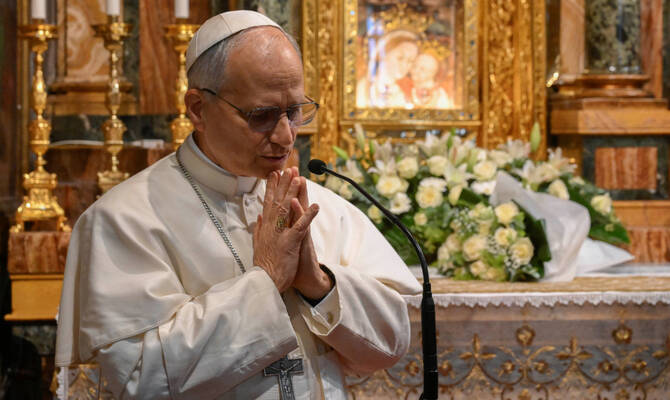
Previous Shireen Abu Akleh’s brother: holding the killers accountable is a moral and political imperative

by Wadie Abunassar, Arab News
Last Thursday, the College of Cardinals elected Cardinal Robert Francis Prevost as the new pope, succeeding Pope Francis, who died on April 21. The new pope chose the name Leo XIV, inspired by his predecessors who bore the same name and by the symbolic meanings associated with it, which are worth reflecting on.
The name “Leo” means “lion.” However, this lion does not represent worldly power, but the power of love — following the example of Jesus Christ, the founder and greatest teacher of the church.
It is believed that the new pope chose this name in honor of Pope Leo I, who in 452 met Attila the Hun, the invader of Europe who terrified the Roman emperor. The pope met him without armies and persuaded him not to attack Rome.
Others believe he was inspired by Pope Leo XIII, famous for his encyclical Rerum Novarum, issued on May 16, 1891 — a significant document defending the rights of the working class, which was suffering from exploitation and serious challenges at that time.
Some people fear the new pope because he is American. But this fear is rooted in superficial analysis. First, it generalizes Americans in a way that is detached from reality. Second, it overlooks the fact that the elected pope left the US and served for more than 25 years in Peru, South America, far from his homeland, dedicating himself to the weak and marginalized.
Notably, in his first speech from the balcony of St. Peter’s Basilica, he did not speak in English or refer to his American roots. Instead, he spoke in Spanish, addressing the diocese he once led in Peru.
In his speech, the new pope said that he is an Augustinian, meaning he belongs to the Augustinian order, named after St. Augustine, who lived in North Africa (354–430). A core principle of this order is sharing what you have with others—unlike many political leaders today, who not only hoard what they have but also seek to take what belongs to others.
It is worth noting that the new pope was elected relatively quickly, in the third round of voting by the College of Cardinals and less than 30 hours after the conclave began. This reflects the strong confidence he enjoyed among the cardinals, having secured more than two-thirds of their votes.
This may be attributed to his positive reputation during his service in Peru and his work alongside Pope Francis over the past three years as head of the Congregation for Bishops.
The pope aims to promote reconciliation — building bridges with and among all people.
Wadie Abunassar
Many wrongly see the pope as merely a head of state. This is a common misconception among politicians who expect the pope to support one side over another or align with a political faction. Though he leads the smallest state in the world, the pope is primarily the shepherd of the largest spiritual body on earth, the Catholic Church.
So, it is inaccurate to focus solely on the Vatican when discussing the pope. The Vatican is simply the seat of the pope, who leads the Holy See, which holds spiritual authority over more than 1.3 billion people.
Most of the popes’ positions and actions stem from their pastoral role, not from political motivations. Though historical context and politics have an influence, the vast majority of popes have aimed to emulate Christ, each with their own approach and personality.
I advise anyone looking for a mere “employee” in the Pope to look elsewhere. The pope cannot endorse wrongdoing or stay silent in the face of injustice, especially in a world increasingly ruled by narcissistic and populist leaders who endanger not only their people but also global stability.
Pope Leo XIV chose two words as his motto: “Hope and Reconciliation.” In an age of turmoil, hope still lives. Like Christ, he wishes to offer hope to those walking in darkness and living in fear and anxiety. He also aims to promote reconciliation — building bridges with and among all people, fulfilling Christ’s desire that we love one another as we love ourselves.
I pray to the Almighty to support the pope in his new mission and grant him success for the good of all people, especially the faithful — that he may face all challenges with the power of love, not the love of power, which is glorified by the wicked and, sadly, by some people as well.
• Wadie Abunassar is the coordinator of the Holy Land Christian Forum, a group of Christian laity that works to empower the Christian presence in the holy land and promote closer ties with all components of the local society.


تكافح مجلة “ملح الأرض” من أجل الاستمرار في نشر تقارير تعرض أحوال المسيحيين العرب في الأردن وفلسطين ومناطق الجليل، ونحرص على تقديم مواضيع تزوّد قراءنا بمعلومات مفيدة لهم ، بالاعتماد على مصادر موثوقة، كما تركّز معظم اهتمامها على البحث عن التحديات التي تواجه المكون المسيحي في بلادنا، لنبقى كما نحن دائماً صوت مسيحي وطني حر يحترم رجال الدين وكنائسنا ولكن يرفض احتكار الحقيقة ويبحث عنها تماشيًا مع قول السيد المسيح و تعرفون الحق والحق يحرركم
من مبادئنا حرية التعبير للعلمانيين بصورة تكميلية لرأي الإكليروس الذي نحترمه. كما نؤيد بدون خجل الدعوة الكتابية للمساواة في أمور هامة مثل الإرث للمسيحيين وأهمية التوعية وتقديم النصح للمقبلين على الزواج وندعم العمل الاجتماعي ونشطاء المجتمع المدني المسيحيين و نحاول أن نسلط الضوء على قصص النجاح غير ناسيين من هم بحاجة للمساعدة الإنسانية والصحية والنفسية وغيرها.
والسبيل الوحيد للخروج من هذا الوضع هو بالتواصل والنقاش الحر، حول هويّاتنا وحول التغييرات التي نريدها في مجتمعاتنا، من أجل أن نفهم بشكل أفضل القوى التي تؤثّر في مجتمعاتنا،.
تستمر ملح الأرض في تشكيل مساحة افتراضية تُطرح فيها الأفكار بحرّية لتشكل ملاذاً مؤقتاً لنا بينما تبقى المساحات الحقيقية في ساحاتنا وشوارعنا بعيدة المنال.
كل مساهماتكم تُدفع لكتّابنا، وهم شباب وشابات يتحدّون المخاطر ليرووا قصصنا.